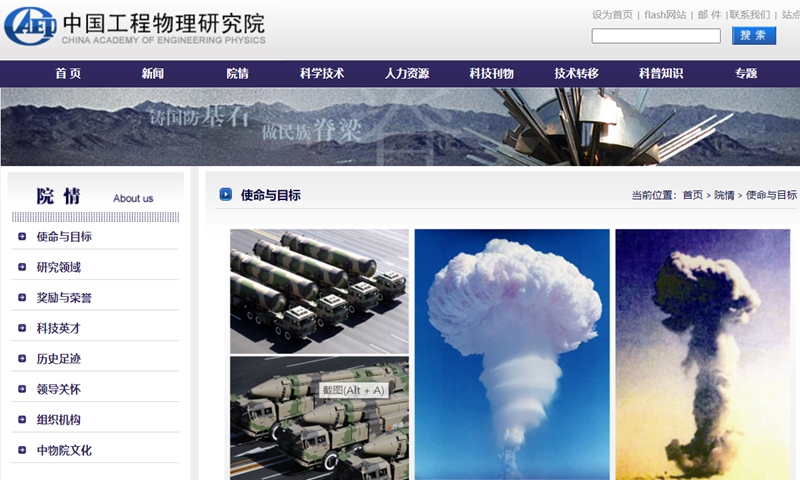Chinese top leaders visit key national defense, high-tech hubs in latest move to push for homegrown innovation

Photo: Screenshot of China Academy of Engineering Physics website
Chinese Vice Premier Liu He recently visited a southwestern city in China known for its expertise in the national defense military and scientific research as well as a top engineering physics academy in the city, the latest of several visits by Chinese top leaders in the past two weeks that are aimed at pushing for homegrown innovation and calling for breakthroughs in key technologies amid an escalating tech war between China and the US.
Liu, also a member of the Political Bureau of the Communist Party of China Central Committee, on Saturday visited the city of Mianyang in Southwest China's Sichuan Province, which is the only designated science and technology city in China and the second largest economy in Sichuan Province.
Mianyang is home to an important national defense and military industry and scientific research base in China. Eighteen national-level scientific research institutes, including the China Academy of Engineering Physics, 14 higher education institutions and a number of academicians and technical talents, have made the city their base.
According to the Xinhua News Agency, Liu emphasized that the city should focus on strengthening independent innovation capabilities, intensify research on key core technologies and make every effort to ensure the construction of major national projects.
He also urged the city to build industrial clusters with core competitiveness that could support the development of high technologies such as satellite navigation, information security, and intelligent equipment manufacturing.
During the visit, Liu visited the China Academy of Engineering Physics, whose missions and aims are to promote the continuous development of cutting-edge defense weapons and to ensure the country's strategic deterrent force is always safe, reliable and effective.
According to the academy's website, research is being conducted in the fields of physics, mechanics and mathematics, chemistry and materials, information science and electronic engineering, and other areas. Research projects have studied shock wave physics, plasma physics, nuclear physics, detonation physics, computational physics and arms control physics.
The academy is the only nuclear weapons development and production department listed in China's national scientific research plan.
Many scientists, including Yu Min and Deng Jiaxian, who were awarded the "Two Bombs and One Satellite Merit Award" in 1999, had held important duties at the academy.
The "Two Bombs and One Satellite" spirit was also mentioned by Chinese President Xi Jinping at a symposium attended by scientists in Beijing on September 11. At the symposium, President Xi stressed advancing the development of science and technology to a deeper and broader level.
Following the symposium, Xi also made remarks while visiting Sunward, an advanced machinery manufacturer, in Changsha, Central China's Hunan Province on Thursday afternoon, saying "Key and core technologies must be firmly held in our hands."
On September 14 and 15, while visiting some chipmakers and other high-tech firms in Wuhan, the capital city of Hubei, Vice Premier Han Zheng also pushed for the commercialization of new technologies, and called for enhanced policy support for technological advancement.
Experts said it's obvious Chinese society, from the top leaders to the grassroots, have reached a consensus to fight against "technology hegemony" of the US, which is moving to strangle Chinese tech giants, notably Huawei, using administrative weapons.
Bai Chunli, president of the Chinese Academy of Sciences, also suggested turning technologies mentioned in US' technological containment list into China's mission for future scientific and technological development, for example, the development of key raw materials and mask aligner for making chipsets.
China will make a new plan of technology innovations, in the areas of supercomputers, key materials and other core technology products which currently rely on imports, said the Chinese Academy of Sciences on Wednesday in a press release.
